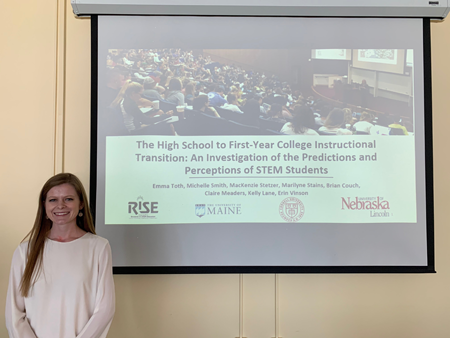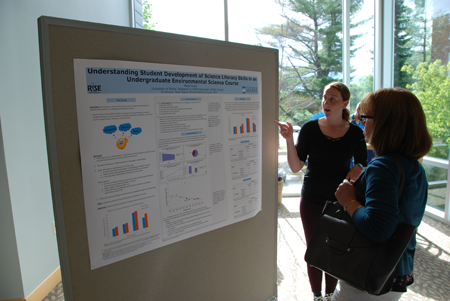MST Program Details: Thesis Information
General Overview
The MST program seeks to build a culture of evidence within its students and faculty by using assessments formatively to guide instruction and summatively to evaluate teaching and learning. The thesis work that MST students do provides opportunities for in-depth study of important problems in teaching and learning, including design of reliable, valid instruments, collection and analysis of data, and drawing conclusions and making recommendations based upon evidence.
The MST is a 33 credit hour Master’s Degree program containing courses that integrate discipline-specific content and research-based instructional strategies. Five of the required 33 hours are devoted to the completion of an educational research thesis project. Used herein, the term “educational research” encompasses all systematic inquiry into the teaching and/or learning of science, mathematics or computer science leading to the development of new knowledge about teaching and/or learning.
The MST program works with RiSE Faculty from a variety of STEM disciplines to find the right project for incoming students. Each student will have a faculty advisor and two committee members to guide them through the nuances of education research and the process of completing a thesis. Students conducting research for their MST thesis projects will:
- Identify a unique education research question.
- Identify existing research relevant to this question, and apply it to the context of the project.
- Collect, reduce, analyze, and interpret data appropriate to the research question.
- Draw conclusions from the analysis, at the proper level of generality, and articulate their significance.
- Recognize and explain the limitations of the study and suggest, as appropriate, future study topics.
Sample Research Questions
The following are examples of appropriate research questions and are presented as guides to help establish the breadth of this field of study. Please take note of the range of settings and scales for the studies.
- Is the construction of three-dimensional models from topographic maps an effective strategy for teaching seventh graders how the maps depict the lay-of-the-land?
- What pre-existing ideas do ninth graders have about the use of variables in algebraic equations?
- Is peer-led team-learning an effective strategy for improving the understanding of chemistry students in high enrollment introductory courses in college?
- What epistemological beliefs do students possess about learning in introductory biology laboratories? How do differences in their beliefs impact their learning?
- When introductory physics is listed as a prerequisite for taking geophysics, what specific content knowledge does the geophysics professor assume the students will possess, and do the students possess it? Do the students with this knowledge do better in geophysics?



